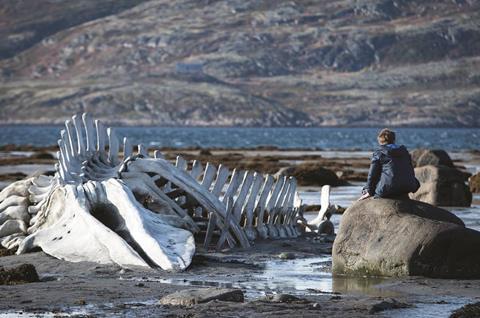Dir: Andrei Zviagyntsev. Russia. 2014. 141mins

Thoroughly Russian down to the smallest detail, this astounding but terrible portrait of a world going to the dogs under the full protection of law and order - and the Holy Church as well - could fit in, with only minor tuning, into any other background around the world. The sheer impact of its images will stun audiences even before they find out what it is all about. The northern Russia landscapes, all bathed in a chilly blue light that seem to freeze souls are the backdrop,and Philip Glass’ mighty waves of sound leave no doubt that an unusual experience is about to unfold on the screen. As it indeed does.
Mikhail Kirchman’s cinematography is striking, a marvel to behold at all times, whether he deals with dark interiors or vast landscapes.
As a matter of fact, this tale of graft, multiple betrayals, corruption and larceny is so universally familiar that one could imagine it unfolding anywhere. In this case, however, it takes place in a small town on the shore of the Barents Sea (think Murmansk if it’s any help). The crooked mayor Cheleviat (Roman Madianov), complete with Putin’s portrait on the wall behind his desk, fancies a piece of land by the sea overlooking a glorious landscape which belongs to an impulsive, hot-tempered mechanic named Kolia (Alexei Serebriakov), who lives there with his wife Lilia (Elena Liadova) and his son from a previous marriage, Roma (Sergei Pokhodaev).
Kolia won’t give it up, so the mayor takes him to court, fixes the judges and the verdict unsurprisingly means Kolia and his family are throw out. Dimitri (Vladimir Vdovitchenkov), an old Army pal and now a successful Moscow lawyer, comes to his help, threatening to reveal all the past crimes of the slimy, drunken mayor and use his leverage with a top politician in the capital if his friend is not lavishly compensated for his loss.
Everything could have ended there, but the mayor doesn’t like to be humiliated in public and seeks revenge, while the crafty Moscow layer commits the unforgivable sin of starting an affair with his friend’s wife.
The essence, however, is not in the plot, but in the images. Every one of the shots looks like a lecture on the distribution of characters and landscape in the space of one frame, the work being almost too meticulous for its own good, so evident is it to the naked eye. He keeps a deliberately slow pace all through, allowing him to cover, one after the other, all the topics he had on his agenda.
And there is nothing missing on this agenda. The corruption of law across the board, from the policemen in the field to the judges in the courts; the political and religious quagmire (suggested at one point by pigs being fed in a pigsty); the inordinate absorption of alcohol at any given moment, and for any reason in sight - be it happiness, worry, despair or tension - the revolting hypocrisy of a church blessing anyone that pays the right price. Add to that the weakness of human flesh , the typical willingness of every person to believe the worst about the next, and the eternal conflict between parents and their children.
The script ties it all together, sometimes not in the most original manner, but always deft enough to coherently and intelligently integrate every single one of these motives. Less secretive than his earlier movies, Zviagyntsev makes no bones about what he thinks or who knows about it. He dwells upon the brutal streaks in his characters but also their extreme pathos, He can be cynical, critical or purely disgusted, as he builds all the evidence to prove that freedom of choice, or any other freedom for that matter, in world like ours, is pure fiction invented by the power of state and the illusions of religion to keep men at bay.
He can convey with one shot, like the crane tearing apart the house on the beach, an entire tragedy. He shows a policeman using the portraits of former Russian rulers for target practice but does not include the last ones because he needs “the perspective of time” and has a knack of keeping momentous events off-screen, to exercise the viewer’s imagination.
Mikhail Kirchman’s cinematography is striking, a marvel to behold at all times, whether he deals with dark interiors or vast landscapes. Alexei Serebriakov’s Kolia has all the intensity of a bomb about to explode and Elena Liadova opposite him offers an almost silent, understated but highly suggestive performance. As for Anna Oukolova and Alexei Rozine, playing the couple’s closest friends, they look like a study of the Russian soul laid bare. Maybe it’s not always pretty, but it is terribly human.
Production company: Non-Stop Productions
International Sales: Pyramide International, www.pyramidefilms.com
Producers: Alexander Rodnyanovsky, Sergei Melkumov
Screenplay: Oleg Neguin, Andrei Zviagyntzev
Cinematography: Mikhail Krichman
Editor: Anna Mass
Production designer: Andrei Ponkratov
Music: Philip Glass
Cast: Alexei Serebriakov, Elena Liadova, Vladimir Vdovitchenkov, Roman Madianov, Anna Oukolova, Alexei Rozin, Sergei Pokhodaev





















